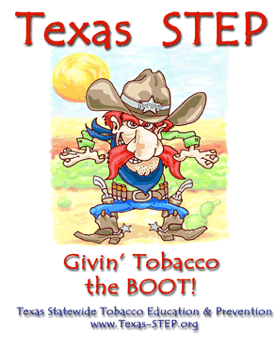 May 22, 2009 - Smoke-free Texas legislation banning smoking in nearly all workplaces falls short. Senator Rodney Ellis (D-Houston) today, May 19th announced that the effort to pass smoke-free Texas legislation has fallen short in the Texas Senate.
May 22, 2009 - Smoke-free Texas legislation banning smoking in nearly all workplaces falls short. Senator Rodney Ellis (D-Houston) today, May 19th announced that the effort to pass smoke-free Texas legislation has fallen short in the Texas Senate.
Senate Bill 544 would have eliminated smoking in indoor public places, including municipal worksites and private worksites including restaurants, restaurant bars and stand-alone bars. The legislation would have levied a maximum fine of $100 for owners, managers or operators, but exempted cigar bars and tobacco shops.
The bill was supported by the American Cancer Society, American Heart Association, the Texas Restaurant Association and others, was derailed in large measure due to an intense lobbying efforts by tobacco companies. According to the Dallas Morning News, Big Tobacco interests have hired 40 lobbyists and are spending between $1.2 and $2.4 million lobbying against the smoking ban and a new formula for taxing chewing tobacco.
Companion news brief; Texas - tobacco lobbyists - derailing state smoking ban/smokeless tobacco tax change...
Reference: Ellis set to hold "wake" for smoking ban [UPDATED], Texas Politics, 5/19/2009.
Bringing the World of Tobacco Control closer together..
Texas - smoke-free legislation falls short..
Subscribe to:
Post Comments (Atom)


To Provide Public Awareness
Purpose
About Us
Contact Us
2008 HIGHLIGHTS
TOPIX PAPERS - 2008 & 2009..
Archive
-
▼
2009 (1446)
-
▼
05/17 - 05/24 (29)
- Pennsylvania may begin to tax OTPs - do it by Wei...
- Louisiana - will smoking ban be expanded..
- U.S - PACT legislation passed by House..
- U.S. appeals court fines tobacco companies lied..
- Texas - smoke-free legislation falls short..
- Ireland - as of July 1, 2009 no advertising or di...
- Florida Governor Charlie Crist stated he will all...
- U.S Senate committee approves FDA tobacco regulati...
- U.S. - PACT Legislation to be considered by House ...
- PM USA found more counterfeit Marlboro cigarettes ...
- U.S. Senate Health Committee Adopts Merkley-Brown ...
- North Carolina Governor Purdue signs smoking ban l...
- Indonesia - dispute with U.S. over banning the u...
- Bulgaria's tobacco monopoly may be up for sale..
- Scotland - cigarette vending machines removal..
- Kids apt to smoke if mom did while pregnant..
- Altria cites smokeless items as key for business..
- Ethiopia - Tobacco Enterprise will punish illegal ...
- Tobacco Fed Regs is Philip Morris running the show..
- San Francisco - smokers may pay for cigarette litt...
- Altria - proposal defeated to remove nicotine fro...
- England - pregnant women getting paid to stop smok...
- California Supreme Court rules consumers can file ...
- Wisconsin Governor Doyle signs smoking ban..
- Smell associated with being a smoker may have more...
- Denmark - e-cigarettes can not be sold OTC..
- Hong Kong - attempt to delay July 1, 2009 smoking ...
- C-Store Update: blunts, Columbus c-store customer,...
- Turkey - quit smoking photo displayed in İstanbul'...
-
▼
05/17 - 05/24 (29)
© Copyright Notice: The content of this website is for information education purposes only and any newsbrief may be used only as "fair use" for information/education purposes with permission of the authors and providing that original references and associated reference links are included in HTML format.
1 comments:
May 22, 2009 at 3:34 PM
Publications and researchPublications and research
Research
Evaluations
Synthesis project
Grant Results
The RWJF Anthology
Publications by topic
Publications by type
The SmokeLess States Program
from To Improve Health and Health Care, Volume VIII Print Print all sections E-mail Share Text size: A A A 2005
By: Gerlach KK and Larkin MA
Bookmark & Share
Favorites Google
Digg Del.icio.us
Twitter Facebook
>> More...
This chapter describes SmokeLess States®: National Tobacco Policy Initiative, one of the largest investments made by the Robert Wood Johnson Foundation, with $99 million authorized in grants since 1992. Primarily, grants were awarded to non-governmental organizations, with the intention that they would educate the public and policy-makers about the tobacco problem. Two features about the program are significant: (1) the Foundation encouraged its grantees to be activists; (2) advocacy was emphasized to bring about policy change. The program relied heavily on three major health voluntary organizations: the American Cancer Society; the American Heart Association and the American Lung Association. They provided financial support and, in particular, funds to help lobbying efforts which the Foundation could not support directly. In addition to insight on the effects of advocacy, this chapter offers a window into the role of coalitions in bringing about social change. The program ended in 2004 and its lasting impact has yet to be determined.
Here's the link
www.rwjf.org/pr/product.jsp?ia=143&id=14912
Post a Comment